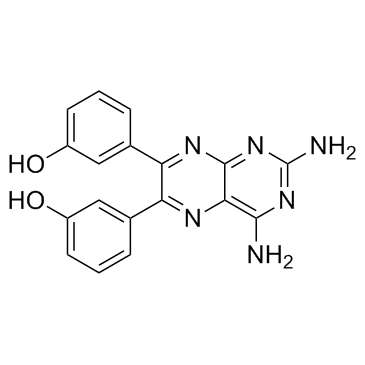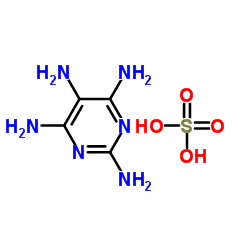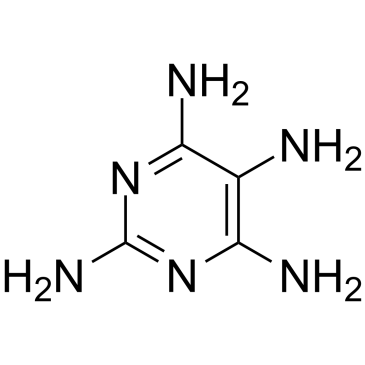TG100-115

TG100-115 structure
|
Common Name | TG100-115 | ||
|---|---|---|---|---|
| CAS Number | 677297-51-7 | Molecular Weight | 346.343 | |
| Density | 1.5±0.1 g/cm3 | Boiling Point | 699.6±65.0 °C at 760 mmHg | |
| Molecular Formula | C18H14N6O2 | Melting Point | N/A | |
| MSDS | N/A | Flash Point | 376.9±34.3 °C | |
Use of TG100-115TG100-115 is a selective PI3Kγ/PI3Kδ inhibitor with IC50s of 83 and 235 nM, respectively. |
| Name | 3-[2,4-diamino-7-(3-hydroxyphenyl)pteridin-6-yl]phenol |
|---|---|
| Synonym | More Synonyms |
| Description | TG100-115 is a selective PI3Kγ/PI3Kδ inhibitor with IC50s of 83 and 235 nM, respectively. |
|---|---|
| Related Catalog | |
| Target |
PI3Kγ:83 nM (IC50) PI3Kδ:235 nM (IC50) |
| In Vitro | TG100-115 inhibits PI3Kγ and PI3Kδ with IC50s of 83 and 235 nM, respectively, whereas both PI3Kα and PI3Kβ are relatively unaffected (IC50 values >1 μM). As a gauge of general specificity, TG100-115 is also assayed against a 133 protein kinase panel, none of which are inhibited at IC50 values <1 μM. TG100-115 potently inhibits edema and inflammation in response to multiple mediators known to participate in myocardial infarction, including vascular endothelial growth factor and platelet-activating factor; by contrast, endothelial cell mitogenesis, a repair process important to tissue survival after ischemic damage[1]. |
| In Vivo | To correlate these in vivo responses with the molecular target of interest, PI3K pathway signaling is monitored through western blot analyses of Akt phosphorylation (a PI3K-mediated event). VEGF injection i.v. in mice induces a rapid Akt phosphorylation readily detectable in lung lysates, pretreatment with TG100-115 blocks this response. Blockade is seen with TG100-115 doses as low as 0.5 mg/kg and persists over a period of several hours. In initial dose-ranging studies, generally equivalent responses are observed using TG100-115 doses of 0.5-10 mg/kg, and we therefore elected to conduct a statistically powered test at the lowest dose. Animals dosed with TG100-115 as a single 0.5 mg/kg i.v. bolus 30 min after reperfusion developed smaller infarcts vs. vehicle-treated controls. Measuring infarct area as percent of total LV ischemic area, infarct size is reduced by 35% (P=0.04). Viable tissue within the ischemic zone is increased by 37% (P=0.04), directly demonstrating the cardioprotective effect of PI3Kγ/δ inhibition[1]. |
| Kinase Assay | PI3K reactions are constructed by using recombinant human kinases, 3 μM ATP, phosphatidylinositol substrate, and cofactors, and reaction progression measured by using a luminescent-based detection system to quantify ATP consumption. Protein kinase assays are performed by using commercial screening services[1]. |
| Cell Assay | Human umbilical vein EC plated in 96-well cluster plates (5,000 cells/well) are cultured in assay medium (containing 0.5% serum and 50 ng/mL VEGF) in the presence or absence of test compounds (e.g., TG100-115) (10 μM), and cell numbers are quantified by XTT assay 24, 48, or 72 h later[1]. |
| Animal Admin | Rats[1] Sprague-Dawley rats (175-200 g) are dosed i.v. with either TG100-115 (1 mg/kg) or vehicle, and 1-4 h later Evans blue dye is administered i.v. as 500 μl of a 2% sterile saline solution. Immediately after dye injection, animals are injected intradermally on each shaved flank with 100 μL of saline, VEGF (2 μg/mL stock), or histamine (10 μg/mL stock). Thirty minutes later, injection sites are photographed. |
| References |
| Density | 1.5±0.1 g/cm3 |
|---|---|
| Boiling Point | 699.6±65.0 °C at 760 mmHg |
| Molecular Formula | C18H14N6O2 |
| Molecular Weight | 346.343 |
| Flash Point | 376.9±34.3 °C |
| Exact Mass | 346.117828 |
| PSA | 144.79000 |
| LogP | 0.99 |
| Vapour Pressure | 0.0±2.3 mmHg at 25°C |
| Index of Refraction | 1.803 |
| Storage condition | -20℃ |
|
~93% 
TG100-115 CAS#:677297-51-7 |
| Literature: TargeGen, Inc. Patent: US2005/282814 A1, 2005 ; |
|
~91% 
TG100-115 CAS#:677297-51-7 |
| Literature: Palanki, Moorthy S. S.; Dneprovskaia, Elena; Doukas, John; Fine, Richard M.; Hood, John; Kang, Xinshan; Lohse, Dan; Martin, Michael; Noronha, Glenn; Soll, Richard M.; Wrasidlo, Wolfgang; Yee, Shiyin; Zhu, Hong Journal of Medicinal Chemistry, 2007 , vol. 50, # 18 p. 4279 - 4294 |
| Precursor 3 | |
|---|---|
| DownStream 0 | |
| 3,3'-(2,4-diaminopteridine-6,7-diyl)diphenol |
| TG-100-115 |
| Phenol, 3,3'-(2,4-diamino-6,7-pteridinediyl)bis- |
| 3,3'-(2,4-Diamino-6,7-pteridinediyl)diphenol |
| 3,3'-(2,4-DIAMINO-6,7-PTERIDINEDIYL)BISPHENOL |
| 6,7-bis-(3-hydroxyphenyl)-pteridine-2,4-diamine |
| S1352_Selleck |
| 3-[2,4-diamino-6-(3-hydroxyphenyl)pteridin-7-yl]phenol |
| TG100-115 |


